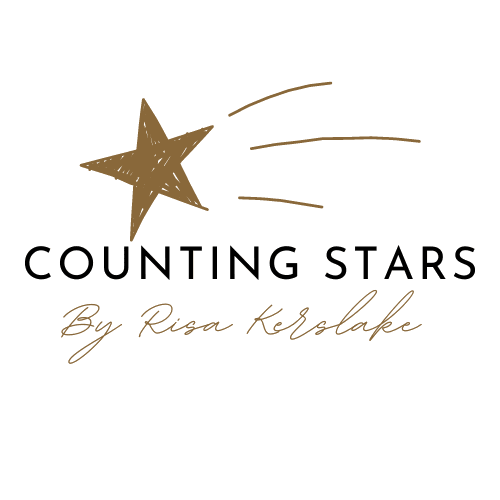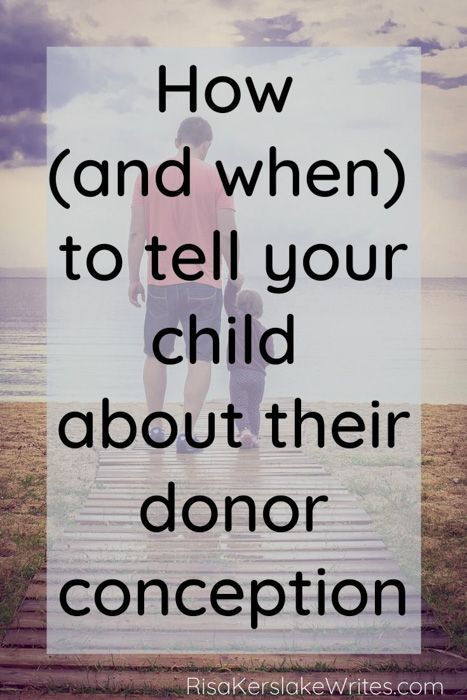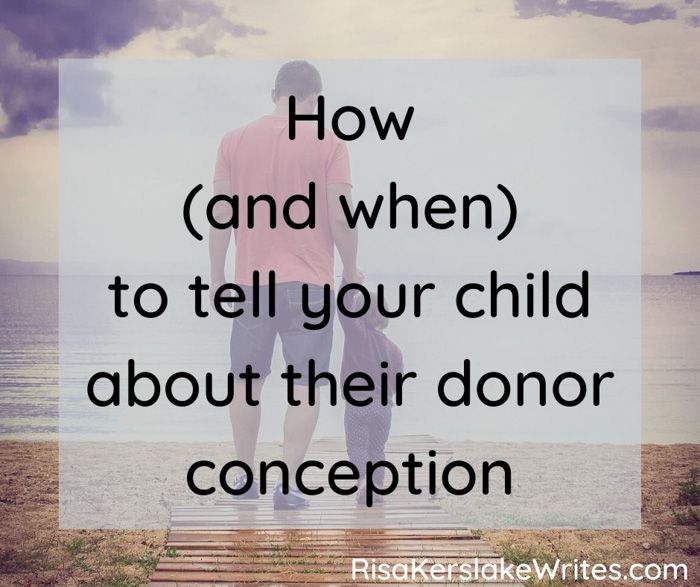Third-party reproduction such as egg donation is not the same as adoption. Adoption isn’t the same as using an egg donor to conceive a child. But it does fall under the umbrella of similar issues parents face and one of those is disclosing to your child about their donor conception. And in my research, own experience, and the experience of those who email me on a weekly basis, this is an issue that is sorely missing from the instruction booklets they give you when you undergo donor egg IVF.
I was reading this post the other day on adoption from another blogger and this quote stuck out to me:
Time and time again, I hear this from well-meaning parents: We’re waiting until our child is ready to hear.
What I hear behind the words, though, is this: We’re waiting until we’re ready to tell.
There are some really great clinics with great success rates with donor eggs, but there’s not a lot of preparation given about how to tell your kid in the future that you used a donor. For instance, my clinic didn’t require any sort of psychological evaluation before I chose my egg donor and moved forward with my cycle.
I’m not an expert in this. I’m not a professional and to really understand and have help in this, it’s a good idea to speak with a therapist who specializes in this area. But I can tell you my own experiences with having kids after using an egg donor.
Before we talk about the how though, it’s important to first talk about the when.
When should I tell my child we used an egg donor?
Long story short: As soon as possible. Before they can really even understand. When my daughter was still under a year, when I was babbling to her about the dinner I was going to make and my step by step commentary as I changed her diapers, I was telling her that she came from a special lady’s gift and how much we appreciated her sacrifice. I bought a book called A Very Special Lady and read it to her before she was talking consistently. I admit I didn’t do it as often as I wanted and now that she’s four, I’m starting the conversations with her again. She knows a doctor helped put her inside me and a piece of a special lady was mixed with a piece of her daddy to make her. After talking about this with her the other day she asked me if I then ate her or if she went through my vagina to grow in my belly. A smart one, this girl.
The conversations about donor conception don’t have to be long or detailed. They just need to happen, as often as you think you need to. The point being by the time they’re really old enough to understand, there won’t be any special (read: awkward) talk—they’ll just always know.
So bottom line. Talk about it early. This is less for them as for your own comfort. It’s like telling them about sex—most of us are more embarrassed about it than they are. The more you discuss it in your household, the less of a Big Deal it is as they grow. Year by year, you can get more and more detailed the more they understand but have the conversations now so that it becomes second nature by the times they’re preteens.
So how do I talk about donor conception with my kids?
There are a few things I’ve done and a few things I’d recommend.
- Get a book. I’m planning on getting another soon, but they weirdly are on the more expensive side and are never on sale, so I haven’t gone crazy. But buy a book or two and read it to them. Here are some ideas. Better yet, make one on Shutterfly about their own conception journey. It makes it more special. I have yet to do this, but I’m planning on making one for both my daughters.
- Consider seeing a therapist who specializes in third-party reproduction. There are some great ones out there, but they may be hard to find. And they may not take insurance. But having even just one session to help prepare you for a conversation with your child can help. They may even be helpful to you when your child is older, the conversation is about to become more in-depth, and you want the right words to say.
- Keep to the facts, and keep it simple when they’re young. Again, my daughter knows there was a doctor that helped us get pregnant. She knows a special lady gave us a special gift and that combined with a part of her daddy made her into a baby. As she gets older, we’ll talk about sperm and egg and how this egg came from the special lady who helped us. Usually, we talk about it for two minutes tops and she’s on to the next exciting thing.
- Recognize your own insecurities. Using an egg donor was hard in the beginning, but I wanted a baby more than I wanted to keep doing IVFs with my own crappy eggs. It wasn’t until I was pregnant, that I was realizing how hard this really was. And since I was public about the fact, I got some really insensitive comments. Questions about what the donor looked like, comments about the baby’s “real mom.” Those were shut down pretty quickly, but it made me realize how sensitive I was about all this even though it was 100% my choice to go down this path. This is why it helps to start these conversations with your child as early as possible so that the words flow easier as time goes on.
I’m right in the thick of this with you. My daughter is four and my other daughter is three months. I don’t have this all figured out. I don’t know what I’m doing sometimes (just like parenting in general), but I’m learning as I go.
Feel free to send this on to someone who is contemplating donor eggs or how to tell their own children.
The good news is we’re all in this together and regardless of how inadequate you feel, you’re not alone.



Thanks, Risa. I still feel sensitive myself. It seemed more simple before I had my baby. I like the idea of a book or books; I think that will help me. Some people are very ignorant, unfortunately.
Author
It seemed MUCH more simple back then. I mean, we wanted a baby. Of course, that was what was on our mind.
Thank you. YES!!!! Start at once talking about it. Sounds like you are doing a wonderful wonderful job of it. I really support the idea of making your own story book about the process specific to each child. My extended family has done this and it works really well.